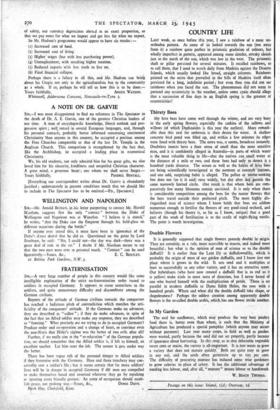COUNTRY LIFE
LAST week, as once before this year, I saw a rainbow of a most tm- orthodox pattern. As some of us looked towards the sun (not away from it) A rainbow quite perfect in prismatic gradation of colours, but wholly imperfect in pattern, appeared among some slender, streaky clouds just to the north of the sun, which was low in the west. The prismatic shaft or pillar persisted for several minutes. It recalled rainbows, so to call them, that I used to watch daily from Madeira against the Deserts Islands, which usually looked like broad, straight columns. Rainbows painted on the mists that prevailed in the hills of Madeira itself often persisted for a long, indefinite period ; but even then you did not see rainbows when you faced the sun. The phenomenon did not seem to portend any eccentricity in the weather, unless some cynic should allege that a succession of fine days in an English spring is the greatest of eccentricities!
Thirsty Bees My hive bees have come well through the winter, and are very busy in the early spring flowers, especially the catkins of the sallows and willows (of which Daphnoides is this year the earliest). More remark- able than this zeal for ambrosia is their desire for water. A shallow concrete bird pond was filled up, and within a few minutes its edges were lined with thirsty bees. The news was, it seems, broadcast instantly. Doubtless insects have a .finer sense of smell than the most sensitive man, and it is confidently alleged in Australia—in parts of which water is the most valuable thing in life—that the natives can .smell water at the distance of a mile or two, and these bees had only to detectit a hundred yards distance. The senses as well as the habits of hive bees are being scientifically investigated at the moment at research Stations, and one odd, surprising habit is alleged. The pollen or nectar-seeking bee does not (so it if said) rove widely, but day after day patrols the same narrowly limited circle. One result is that where bees are com- paratively few many blossoms remain unvisited. It is only when there is considerable competition among the bees for the nearer flowers that the bees travel outside their preferred pitch. The most highly dis- tinguished man of science whom I know holds that bees are seldom numerous enough to fertilise the flowers of any good-sized orchard, and believes (though his theory is, so far as I know, unique) that a good part of the work of fertilisation is to the credit of night-flying moths. The point is worth investigation.
Double Flowers
It is generally supposed that single flowers precede double in origin. They are certainly, as a rule, more accessible to insects, and indeed more beautiful ; but what is the opinion pf men of science as to the double daffodil? It is earlier than the Lent lily or daffadowndilly, which is probably the origin of most of our garden daffodils, and I know lust one place where it grows in the wild. It sets seed and it multiplies at least as successfully as any other variety, and it has an attractive scent. Our hybridisers (who have now created a daffodil that is as red as it is yellow) make trials in most sorts of direction, but I never heard of one who busied himself with the multiplication of petals. There is no parallel in modern daffodils to Dame Edith Helen, the rose with a hundred petals. Where and when did the double daffodil take shape, or shapelessness? Perhaps the oddest creation among apparently double flowers is the so-called double arabis, which,has one flower inside another.
In My Garden
The zeal for sunflowers, which may produce the very best poultry food there is, better even than wheat, is such that the Ministry of Agriculture has produced a special pamphlet (which anyone may secure without payment). Last year many crops, in field as well as garden. were wasted, partly because the seed did not set properly, partly because cf ignorance about harvesting. In this crop, as in that delectable vegetable sweet corn or maize, the variety is all-important. It is just waste to grow a variety that does not mature quickly. Both are quite easy to grow in any soil, and the seeds often germinate up to roc) per cent. The difficulty of procuring manure has induced some wise gardeners to grow celeriac in place of celery. It has the additional advantage of needing less labour, and, after all, "manure" means labour or handiwork.
W. BEAC:H THOMAS.
Postage on this issue: Inland, Id.; Overseas, ad.


























 Previous page
Previous page